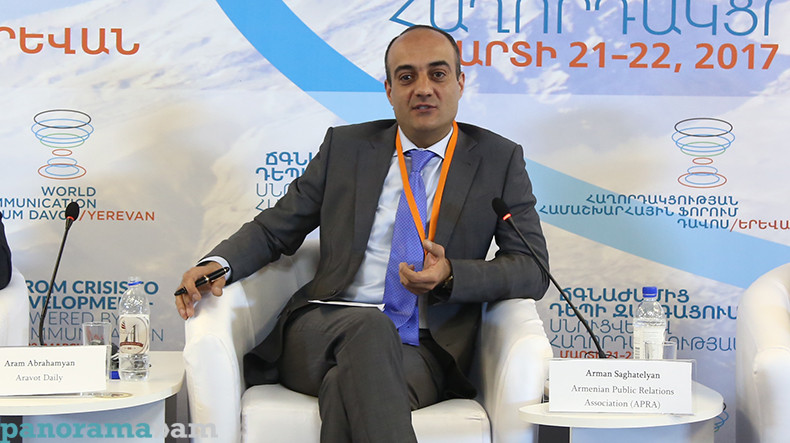
During the April War, the Armenian information field, unlike Azerbaijan, secured obvious advantage – Arman Saghatelyan
“Being always in the middle of crisis, Armenia has managed to use its resources correctly and to come victorious out of any critical situation,” Executive Director of the Public Radio of Armenia Arman Saghatelyan said during the two-day forum of WCFDavos/Yerevan entitled “From Crisis to Development - Powered by Communication” underway in Yerevan.
In his words, Armenia is one of the exceptional countries that has always been in the middle of crisis after the collapse of the Soviet Union – state of war, information propaganda, etc.
“We have been in that cycle for already 25 years,” he said.
Arman Saghatelyan noted that Armenia is included in the list of the 14 countries that has not made any intervention in terms of the control over the internet, i.e. no censorship for the internet exists. And amid such a situation, fighting against the disinformation, fake news or any other masses is quite a difficult, but at the same time a grateful process.
“In this case the state agencies that are in charge of that sphere have to take active steps and demonstrate vigilance. In addition to this, the community of professionals and experts becomes more active trying to put up certain mechanisms for self-regulation,” Arman Saghatelyan underscored bringing the example of the Facebook group Media Literacy, where the experts and the reporters try to point out all the issues in the information field.
The executive director of the Public Radio said that one of the most serious issues of Armenia’s information sector is the fact that some news outlets continue translating ‘the news pieces of the adversaries containing propaganda and disinformation’ and transferring them to the Armenian reality. “This turns into an absurd and it is one of the post serious problems. Extremely ridiculous, obviously false information can be translated from Russian into Armenian and be brought to the Armenian media sphere,” he added.
He also turned to the April four-day war noting that the Armenian information field, unlike the Azerbaijani one, secured an obvious advantage.
“In contrast to the closed systems, we, having an open one, have not restricted the free movement of the news agencies and their opportunity of expression, rather by ensuring security conditions, we allowed the access of the international platforms to the zone of the military operations, to the territory of the Nagorno-Karabakh Republic, so that they can have an opportunity of expressing themselves freely and preparing materials,” Arman Saghatelyan noted.
Summing up, the executive director of the Public Radio said that naturally the open system, the information liberalism, which is supported by Armenia, contain certain risks, in particular one of that risks is the huge flows of disinformation, ‘manipulation’, abuse of the right to freedom of expression and freedom of speech, which emerges serious problems.
“The freedom of speech does not mean permissiveness. We have even more rights than responsibilities, however the advantages are obvious, and that marks our evolution and development. In contrast to the closed systems, we are more stable and have greater intellectual and creative potential due to this all, and we are able to develop and react to the new challenges,” Arman Saghatelyan said.
To note, two-day forum of WCFDavos/Yerevan entitled “From Crisis to Development - Powered by Communication” has today kicked off in Yerevan. The forum is organized by the Armenian Public Relations Association (APRA), in cooperation with Davos World Communication Forum Association,
Related news
- Sean Gardner to write column for The Huffington Post about his visit to Armenia
- Yanina Dubeykovskaya: Today we are in the right place, at the right time and with the right people
- From Crisis to Development - Powered by Communication forum kicks off in Yerevan
Newsfeed
Videos






























